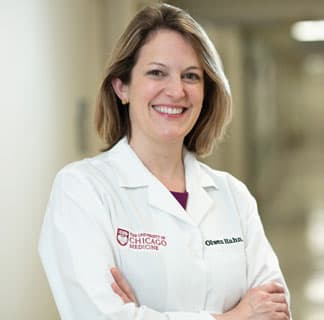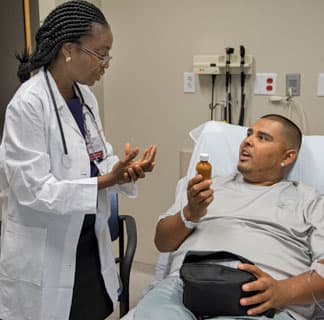Clinical trial, team approach help breast cancer patient survive and thrive

“I felt scared and completely overwhelmed,” said Kerulis, an athlete, fitness professional and therapist. Her family and friends surrounded her with love and support.
One friend — Kerulis refers to her as “my oncologist finder” — took on the task of finding breast cancer care in Chicago. Online research led to the University of Chicago Medicine.
The breast cancer team at UChicago Medicine offers an integrated approach, with expertise across the full spectrum of care. Specialists work together to create a personalized treatment plan that emphasizes not only survival but also quality of life. Because UChicago Medicine is a leading site for breast cancer clinical trials, patients have greater access to new treatments, often before they are available elsewhere.
I didn’t realize until later how lucky I was to be in a trial of a new therapy for my aggressive cancer.
Medical oncologist Rita Nanda, MD, offered Kerulis participation in a clinical trial testing the addition of Keytruda (also known as pembrolizumab) to standard chemotherapy for high-risk, early-stage breast cancers. Keytruda, which helps the body’s immune system fight tumor cells, has FDA approval for use in other cancers including melanoma, lung cancer and head and neck cancers.
Results from the breast cancer trial, known as Rita Nanda, MD, breast medical oncology
“Not all breast cancers are the same,” said medical oncologist Rita Nanda, MD, an expert in the treatment of triple-negative, early onset and hereditary breast cancers. “For many years, there has been a gap in the treatment options available for some types of breast cancers.”
Nanda is a lead investigator on the Nora Jaskowiak, MD, surgical director, Breast Center
“Michele had an amazing response to therapy,” said Nora Jaskowiak, MD, an expert in the surgical management of breast cancer. “The tumor in her breast was ‘melting away’ and there was no evidence of disease.”
This “complete” response put Kerulis at a very low risk for recurrence of her breast cancer.
Jaskowiak explained that both a partial and a full mastectomy would reduce the chances of the cancer returning in her breast. Because she tested positive for a BRCA1 mutation, which put her at increased risk for developing another breast cancer, Kerulis made the decision to have a full mastectomy.
Until recently, patients like Kerulis — who were found to have lymph node involvement prior to starting treatment — would also undergo a procedure called a complete axillary node dissection to remove a large number of lymph nodes from underneath their arm. This extensive surgery involves a difficult recovery and puts women at risk for complications such as numbness and a swelling of the arm called lymphedema.
Instead, during the biopsy at diagnosis, a special metallic clip was placed into the lymph node, which was filled with tumor. Then, on the day of surgery, a small wire was inserted into that node and a tracer was injected to identify other principal draining nodes, also called “sentinel nodes.” By “tagging” the particular node and tracing out the others, Jaskowiak could easily locate and remove only a few nodes during the mastectomy surgery.
“Because the nodes were disease-free after treatment, we didn’t need to remove more lymph nodes,” said Jaskowiak. “This greatly decreased Michele’s chances of getting lymphedema.”
S. Diane Yamada, MD, gynecologic oncologist and chief, Section of Gynecologic Oncology
In fall 2016, gynecologic oncologist S. Diane Yamada, MD, met with Kerulis to discuss her risk for developing ovarian cancer and her options for preventive measures.
“Women with a mutation in the BRCA1 gene have a 40 to 60 percent risk of developing ovarian cancer by age 85,” Yamada said. “Removing the fallopian tubes and ovaries before age 50 reduces that risk by nearly 90 percent.”
Kerulis decided to go forward with this risk-reducing surgery. In December, a few months after the breast surgery, Yamada performed a full hysterectomy on Kerulis, using minimally invasive techniques.
Stacy Tessler Lindau, MD, gynecologist and director, Program for Integrative Sexual Medicine (PRISM)
After her treatment for breast cancer was completed, Kerulis says, she had to “get used to having a new body.” She turned to Stacy Tessler Lindau, MD, director of the UChicago Medicine Program for Integrative Sexual Medicine (PRISM) for advice and care.
Women and girls with cancer can experience sexual problems related to the illness as well as the treatment. The PRISM team at UChicago Medicine combines the expertise of gynecology, oncology, physical therapy, sex therapy and psycho-oncology to address women’s sexual health concerns after cancer treatment.
“We are here to help women understand what is happening to their bodies and how to manage common changes in sexual function after cancer,” Lindau said. “We don’t want any woman to suffer with this issue or to feel alone. Michele wanted to recover her function and embraced the care.”
Kerulis is grateful to Lindau, who she said “emphasized the entire feminine healing process.” Kerulis now serves as a PRISM patient advocate and is a member of its patient advisory board for research.

Sandra Naaman, MD, PhD, internist
Sandra Naaman, MD, PhD, is an internal medicine physician with special expertise in breast cancer survivorship.
“I help patients like Michele in managing the side effects of their cancer treatments and make recommendations for a healthier lifestyle,” Naaman said. “We shift the focus from treatment to staying well.” Naaman sees patients at 150 E. Huron, a UChicago Medicine clinic in the Streeterville neighborhood of Chicago.
“Michele has worked hard and is doing exceptionally well,” Naaman said. “She is very strong now and an inspiration to other breast cancer patients.”

Breast Cancer Care
Our team represents expertise across the spectrum of breast cancer care: breast imaging, breast surgery, medical and radiation oncology, plastic and reconstructive surgery, lymphedema treatment, clinical genetics, pathology and nursing. Our comprehensive care approach optimizes chances of survival and quality of life.
Learn more about UChicago Medicine breast cancer care.
Cancer Immunotherapy
Immunotherapy refers to a medical treatment that turns the power of the immune system against disease. Cancer immunotherapy acts on the cells of the immune system to seek out, recognize and attack cancer.
Learn about immunotherapy options to treat cancer
Participate in a Cancer Clinical Trial
UChicago Medicine cancer experts are actively conducting clinical trials of new screening methods and treatments for cancer, including breakthrough approaches to harnessing the immune system to fight cancer. As a recognized leader in phase I and other early-phase clinical trials, our physician-scientists are creating new cancer treatment methods that later become the standard of care elsewhere.
Find a cancer clinical trial